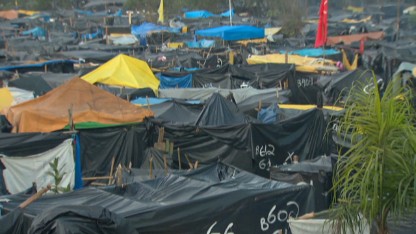
Squatters storm World Cup, demand housing
Sao Paulo, Brazil (CNN) -- Almost overnight, a patchwork of plastic tents appeared on an empty piece of land less than 4 kilometers (2.5 miles) from the World Cup stadium as a show of force from Sao Paulo's working poor.
In a matter of weeks, more than
3,000 families joined the squatters settlement known as the "People's Cup,"
hoping to use the global sporting event as a platform to pressure the government
to provide low-income housing.
On a recent morning, Jucilene de
Oliveira was working in the communal kitchen -- a lean-to made from plastic
tarps and plywood -- preparing lunch for families in her quadrant.
She said her rent in Sao Paulo's
East Zone nearly doubled when the stadium was being built. "We paid 700 reais
($314) on rent, then food and clothes, it was too much," she says.
She, her husband and four
daughters now camp out in a small tent stacked with mattresses, hoping to
persuade the government to build subsidized housing on the occupied land.
"We don't want anything for free,
but we need something we can pay," said the young manicurist. "If we can pay 700
reais a month for rent, we could pay that in installments for a housing
unit."
Rising rent
During the day, the tent city is
a maze of mostly empty lean-tos. New arrivals show up to pitch tents and get
themselves on the list of house seekers coordinated by the Homeless Workers
Movement.
Sometimes it is an entire family
living in a tent. In other tents, family members take turns in spending the
night there.
Rents in the city have risen by
double digits in recent years, far outpacing the increase in minimum wage, which
is $360 a month in Sao Paulo. In the East Zone, a simple two-room apartment now
costs around $300.
But it is hard to say whether
the World Cup has had an impact on rents as the increases have been felt across
the city, not just in the East Zone where the stadium was built.
At night, thousands of people
pour into the settlement as families return from work and others show up for the
nightly assembly. They tell us they won't even watch the World Cup now.
"I always liked the World Cup. I
was Brazilian through and through," says one woman. "But this Cup and the
stadium are making people angry."
Maria das Dores takes the stage
to lead the group in a rally. "Let's hear it for quadrant G1," she shouts and is
greeted by a cheer from the crowd.
Das Dores has been coordinating
land invasions for the movement for eight years. She says the World Cup has done
nothing for Brazil's lowest classes.
"The World Cup and the stadium
here in the East Zone aren't going to leave the legacy that was expected," she
says.
"The legacy is higher rents and
pushing people further outside of the city to the peripheries."
Popular
pressure
In the protests leading up to
the games, The Homeless Workers Movement has become the biggest force out on the
streets of Sao Paulo, with marches of more than 10,000. They lash out at the
government for spending $11 billion on the World Cup instead of schools,
hospitals and public housing.
All the pressure appears to have
paid off.
The government said this week
that it is drawing up plans to build low-income housing on the land occupied by
the People's Cup and that details of the project will be made public this
month.
But the families at the tent
city say they're ready to march on the Sao Paulo stadium at a moment's notice if
those guarantees fall through.
Shasta
Darlington, CNN

No comments:
Post a Comment